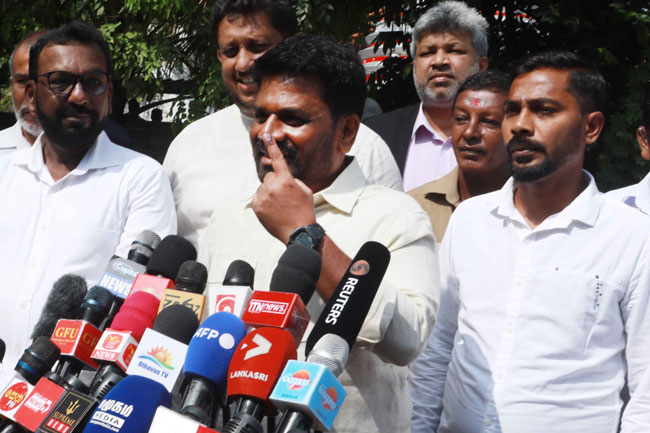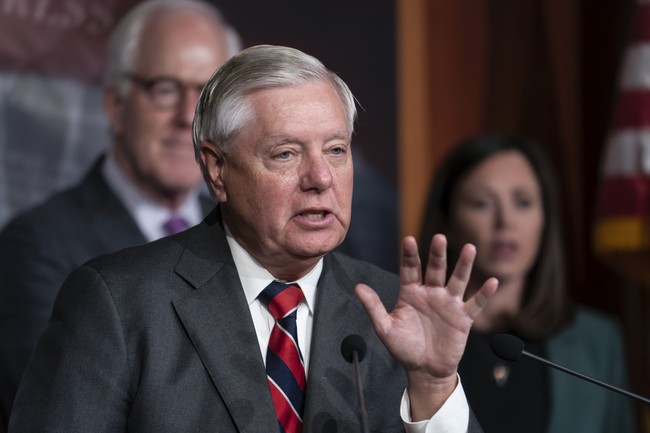Sri Lanka's Political Shift: A Historic Left Victory
Discover how Sri Lanka's leftist coalition achieved an unprecedented victory in the recent parliamentary elections, symbolizing a significant political shift amidst economic challenges.
Published November 16, 2024 - 00:11am

Image recovered from adaderana.lk
The recent parliamentary elections in Sri Lanka mark a historic shift in the country's political landscape. Leading the charge is President Anura Kumara Dissanayake and his leftist coalition, the National People's Power (NPP), securing an overwhelming majority and reshaping the island nation's future. This victory not only reflects a shift in voter sentiment but also highlights the aspirations for systemic change amid ongoing economic challenges.
President Dissanayake, who recently assumed office, cast his vote at the Abeysingharamaya Temple polling station, emphasizing the peaceful nature of the election process. He hailed this election as the most peaceful in Sri Lanka's history, underscoring a political triumph for democracy in the nation. His call for peaceful celebrations post-victory echoes a commitment to democratic values, fostering an atmosphere of hope and unity across the political spectrum.
The NPP's victory is significant, with electoral results showing a commanding lead in the parliament. The NPP secured 159 out of 225 seats, granting Dissanayake the power to pursue major political reforms. This resurgence of leftist politics marks a departure from recent years, where the island was veering towards a more authoritarian governance model. The electorate's rejection of traditional power dynamics signals a deep-seated desire for change, spurred by past grievances and economic hardships.
The victory extends beyond traditional strongholds, with the NPP achieving unprecedented success in regions historically favoring ethnic Tamil and regional parties. This signifies a growing ethnic solidarity across the nation, reflecting in part the nation's painful history of ethnic conflict. Former Minister Ali Sabry remarked the results as a symbol of hope, fostering unity among diverse ethnic and religious communities that were once embroiled in civil strife.
Key to the left's success has been President Dissanayake's distinct approach to leadership, characterized by his grassroots origins and pragmatic vision for economic recovery. Coming from humble beginnings and with a history rooted in the Janatha Vimukthi Peramuna, a former insurgent group, Dissanayake embodies a new breed of leadership. His campaign promises to tackle endemic corruption and economic challenges resonate deeply with a populace weary of longstanding political impasses and financial mismanagement.
The elections provide the NPP with a powerful mandate for change, enabling them to potentially reform the constitution towards limiting executive powers. This constitutional shift aims to address the structural issues that have embroiled the country in political crises, as seen with past administrations. Dissanayake's strategy seeks to balance immediate economic relief with long-term institutional reforms, aiming to lift the nation from its current economic downturn.
The economic crisis looms large over this political upheaval. Having inherited a nation grappling with severe debt and inflation following IMF-imposed austerity measures, the new government faces immense pressure to deliver on public expectations. Dissanayake's economic agenda emphasizes alleviating tax burdens on essential goods while renegotiating the IMF deal to balance relief for citizens with fiscal responsibility. Such measures are anticipated to rejuvenate public confidence and stabilize the economy, fostering a sustainable recovery trajectory.
Electoral analysts highlight the absence of the Rajapaksa family, previously dominant in Sri Lankan politics, signaling a decisive move away from past leadership accused of corruption and ethnopolitical manipulation. Their withdrawal from the election scene marks a broader shift towards empowerment centering around subaltern classes—a critical aspect of Sri Lanka's evolving political narrative.
This electoral milestone underscores a notable anti-incumbency sentiment, as traditional parties failed to regain traction. The voters' disenchantment with old political factions has galvanized support for a fresh approach to governance, represented by the NPP. The coalition's inclusive political ethos and emphasis on democratic engagement create a new paradigm in Sri Lankan politics, focusing on collective governance over individual authority.
As Sri Lanka advances under this newly configured political alignment, the challenges ahead remain substantial. Yet, the optimism surrounding this electoral outcome suggests that the nation is poised to embark on a transformative journey, charting a course towards inclusivity, economic stability, and strengthened democratic institutions.







